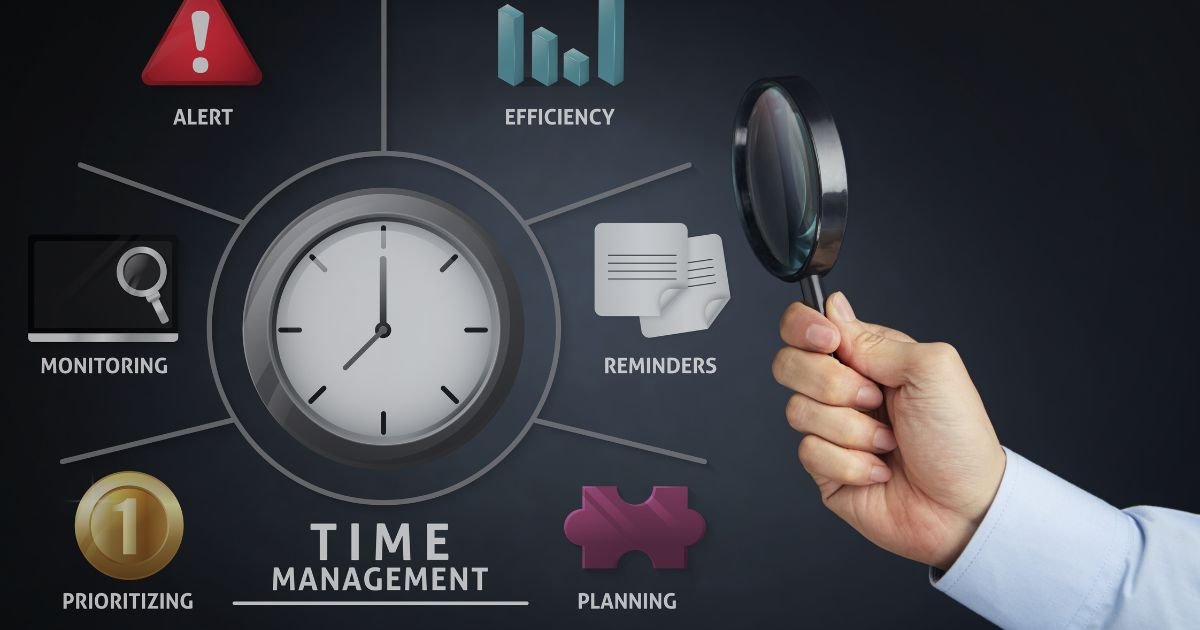Are you struggling with managing your time effectively? You’re not alone. Many of us find it hard to balance work, personal life, and everything else related to them in our daily routine. The simple solution? The 4 P’s of time management.
So what are the 4 P’s of time management? This is a simple, straightforward framework that simplifies time management into four key components Prioritize, plan, productivity, and procrastinate. It’s that simple and it makes it easier to organize your tasks and improve productivity by meeting your end goals.
Time management skills are one of the most important skills one can have in professional life. In this post, we’ll explore how the 4 P’s can help you manage your time better and reduce stress.
I guarantee you that you will find all the details related to the 4 P’s of time management and with that, I will also explain how you can practically use the 4 P’s in your daily time management and make the most of your skills!

Prioritize : Effective time management
This is one of the most important things in time management skills. At this stage, you have to prioritize your tasks by identifying them and it’s recommended to make a to-do list and identify how much time a specific task will take by allocating a specific amount of time for that task.
When you make a checklist and assign the priority to do the tasks at what time, your task is somewhat easy and effective and you may perform your activities and subtasks within the stipulated time. There are some project management software programs as well that can help you keep track of your tasks.
and when you accomplish a task in time, it will further encourage you to go forward with other tasks to do and in this way, prioritizing the tasks makes the chain to accomplish more tasks hence you will be able to complete more tasks and it will increase your productivity.
Plan: Strategies for effective time management to stay on schedule
Planning involves creating a roadmap or schedule for completing tasks and activities and achieving goals within a specific timeframe.
This includes breaking down large goals into smaller, realistic goals, preparing modules by affixing activities to a time schedule and mentioning the affixed time needed to accomplish that activity, manageable tasks, setting deadlines, and organizing your time effectively.
Planning allows you to anticipate potential obstacles, allocate resources efficiently, and stay on track toward achieving your objectives, and task management becomes easy.
Schedule preparation is a difficult task and when you have a schedule, it helps you perform the activity more efficiently and effectively within the targeted time.
From my experience in productivity, here are two key tips: First, you have to make sure your plan directly links to your goals, like what you want to achieve at the end, to keep your time management on track.
Second, always review and tweak your plan based on what’s working or not. So it’s an ongoing process; make sure you access the situation and take action accordingly
Productivity: maximizing the efficiency of your time
When you follow the above checklist of activities and schedule according to the module you have prepared, time management is easy.
Now you have to follow the given tips, When you follow these tips, you can increase your productivity. For most of us early morning is the most productive time of the day. To enhance your productivity more, you can also use productivity tools.
Setting priorities
Always identify and focus on the tasks that have the highest impact or urgency to ensure you’re always working on what matters most and that you are truly on the right track.
Breaking down large tasks into smaller activities
You can easily tackle big projects by dividing them into smaller, more manageable steps, making them less complicated and easier to complete. Breaking down large tasks into smaller activities is very helpful for daily tasks.
Removing hurdles and obstructions
First, you have to identify and eliminate anything that delays or prevents you from working efficiently, such as distractions or unnecessary tasks. This will help you increase your productivity.
Whenever I have to avoid distractions, I set my phone to “Do Not Disturb” mode and use a timer to work in focused intervals, typically for 25 minutes, followed by a 5-minute break. To remain focused, a task break is important and typically a 5-minute break is enough to get things rolling.
Taking breaks and rewarding yourself
Regular breaks help maintain high levels of focus and productivity, while rewards for completing tasks can boost motivation. As discussed above, taking breaks helps you avoid burning out.
Similarly, rewarding yourself after completing tasks or reaching milestones serves as a powerful motivator.
Whenever I reach a significant milestone or complete a challenging task, I reward myself with a small treat, like a piece of chocolate. The simple act of enjoying a chocolate not only provides me with a moment of pleasure but also reinforces my motivation to tackle the next item on my list.
You can reward yourself with a piece of cake or anything else you like the most, according to your mood.
And by the end of the time, when you feel satisfied, you plan for future easily and accomplish a work of future with greater efficiency.
Procrastination: Strategies for Effective Time Management
Procrastination may be defined as delaying or postponing the activity or task you have to perform and this habit is a main hurdle in time management.
You must overcome this nature of attitude; otherwise, you could not effectively do your task within a time frame.
Procrastination further makes you dull, lazy, and somewhat disappointing, delays your performance, and results in poor productivity.
Within the time frame, the whole building collapsed. if you feel disappointed by such results. Procrastination is the main cause of failure.
Tips to avoid procrastination
- Accept that you are procrastinating: Acknowledge when you’re putting off tasks to address the issue directly and quickly.
- Select a good study location: Choose a place that enhances focus, is free from interruptions and is conducive to studying.
- Eliminate distractions: Remove anything that diverts your attention from your work, like turning off phone notifications.
- Set goals you can reach: Break your workload into achievable objectives to avoid feeling burnt out.
- Work with a study group: Collaborate with peers to increase motivation and gain different perspectives on the material.
- Reward yourself: Treat yourself for completing tasks or reaching milestones to maintain motivation.
- Take intervals: Break your study sessions into manageable chunks with short breaks to prevent burnout.
- Hold yourself accountable: Share your goals with someone who can check in on your progress, adding an extra layer of commitment to your tasks.

Why Is Time Management Important?
- Reduces stress: Proper time management will help you decreases the pressure of deadlines, and allow you to work under more relaxed work environment.
- Boosts performance and productivity: When you give importance to time management, it not only enhances your focus but also helps you achieve your target more timely and efficiently.
- Balances life: When you practically follow a timely schedule, your productivity increases, and with increased productivity, you gain more personal time, leading to a well-rounded life.
- Increases time freedom: With effective time management, you can spare time, which can be used for personal activities, relaxation, or even some other tasks that are important and require more attention.
- Enhances focus: Prioritizing tasks allows for greater concentration, improving the quality of work and resulting in quality achievement.
- Prevents procrastination: By organizing tasks, it becomes easier to start and complete work on time, avoiding delays.
- Simplifies task accomplishment: Scheduled and prioritized tasks are easier to tackle and complete.
- Minimizes distractions: Focused work reduces the impact of interruptions, maintaining productivity.
- Elevates energy levels: Managing time well reduces fatigue and stress, leaving you more energetic.
- Provides thinking time: With a calm and organized schedule, there’s more free time for strategic planning and reflection.
How Can I Use the 4 P’s to Prioritize My Tasks?
By following the 4 P’s framework, you can effectively prioritize your tasks, manage your time more efficiently, and achieve greater productivity and success in your personal and professional endeavors.
When you make the best use of your time, you become more focused and productive. Good time management helps you achieve more goals and cross more hurdles In this way, you can reduce procrastination and increase productivity.
Final Thoughts
Well, Mastering the 4 P’s of time management Prioritize, Plan, Productivity, and Procrastinate is a great transformative approach to managing both personal and professional tasks more efficiently and easily.
In this guide, I lay out practical strategies and personal experiences that I have gained over time to help you tackle procrastination, enhance productivity, and ultimately lead to a more balanced and fulfilling life. By using the above strategies, you can easily tackle any task effectively and more easily.
As someone who has personally benefited from using these principles from time to time, I can attest to their effectiveness.



